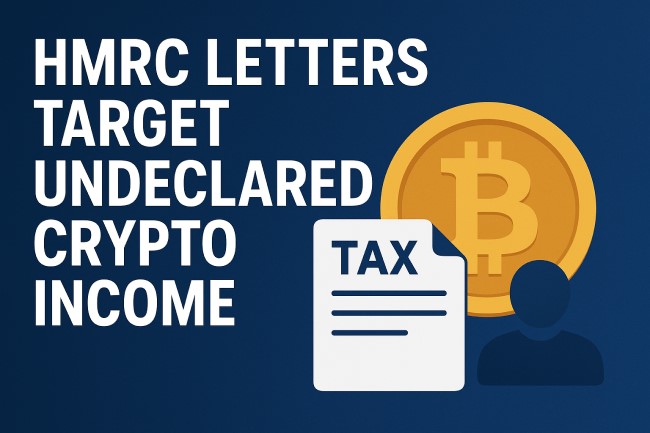HMRC Letters Target Undeclared Crypto Income: What You Need to Know in 2025

The rise of cryptocurrency has opened new doors for investors and traders across the UK. However, it has also caught the attention of HM Revenue & Customs (HMRC). Recently, HMRC has been sending out letters targeting undeclared crypto income, warning individuals who may have failed to report their cryptocurrency gains or transactions.
This article explains everything you need to know about these letters, why HMRC is issuing them, and what steps you should take to remain compliant with tax laws.
Understanding HMRC Crypto Letters
What Are HMRC Crypto Letters?
HMRC crypto letters, often referred to as “nudge letters,” are notices sent to individuals suspected of having undeclared cryptocurrency income or capital gains. They are part of HMRC’s efforts to reduce the tax gap and ensure everyone pays their fair share.
These letters are not always formal investigations but serve as a warning that your crypto activity has been flagged, likely through data shared by exchanges or financial institutions.
Why Is HMRC Sending These Letters?
1. Increased Crypto Usage
With more people trading Bitcoin, Ethereum, and other cryptocurrencies, the government has tightened regulations to ensure compliance.
2. Data Sharing Agreements
HMRC collaborates with crypto exchanges and receives transaction details under Know Your Customer (KYC) regulations. This means your trades and wallet movements are rarely anonymous.
3. Reducing the Tax Gap
By identifying undeclared crypto income, HMRC aims to increase tax collection and discourage tax evasion.
Types of Income HMRC Targets
Understanding what HMRC considers taxable is crucial. These are the main categories of crypto-related taxable activities:
Capital Gains
-
Selling crypto for profit
-
Swapping one cryptocurrency for another
-
Using crypto to pay for goods or services
Income Tax
Some crypto activities may fall under income tax rather than capital gains, such as:
-
Staking rewards
-
Mining income
-
Airdrops and promotional tokens
Failing to declare these transactions can lead to penalties, especially if HMRC determines that the omission was deliberate.
How HMRC Detects Undeclared Crypto Income
HMRC uses several methods to track undeclared income:
1. Exchange Data
Most UK and international exchanges comply with data-sharing laws and report user transactions.
2. Blockchain Analysis
HMRC leverages blockchain analytics to trace transactions and identify wallet addresses linked to individuals.
3. Cross-Border Information Sharing
Under international agreements like the Crypto-Asset Reporting Framework (CARF), data is shared globally to detect tax avoidance.
What to Do If You Receive an HMRC Letter
Receiving a letter from HMRC can be alarming, but prompt and informed action can help you avoid severe consequences.
Step 1: Don’t Ignore the Letter
The letter is a signal that HMRC believes you may have undeclared crypto income. Ignoring it could lead to further investigation, penalties, or even legal action.
Step 2: Review Your Crypto Transactions
Compile a detailed record of all your crypto activities, including:
-
Dates and values of purchases and sales
-
Wallet transfers
-
Income from staking, mining, or airdrops
Step 3: Calculate Your Tax Liability
Work out any capital gains or income tax owed. Use crypto tax calculators or consult a tax professional for accuracy.
Step 4: Make a Voluntary Disclosure
If you discover undeclared income, you can use HMRC’s disclosure facilities to report it. Voluntary disclosure often results in reduced penalties compared to waiting for HMRC to take action.
Step 5: Seek Professional Advice
Crypto taxation is complex. Engaging an accountant or tax advisor who understands crypto regulations can help ensure compliance and minimize risks.
Penalties for Non-Compliance
Failing to declare crypto income can lead to serious financial and legal consequences:
Financial Penalties
-
Interest on unpaid taxes
-
Penalties up to 100% of the tax owed, depending on the severity and intent
Legal Consequences
In severe cases involving deliberate tax evasion, criminal prosecution is possible.
How to Stay Compliant with HMRC
Proactive compliance is the best way to avoid receiving a letter in the first place.
Keep Accurate Records
Track every crypto transaction, including:
-
Purchase and sale dates
-
Amounts and currency values
-
Fees and associated costs
Report Annually
Ensure all gains or income are reported in your annual tax return. Even small gains should be disclosed if they exceed the allowance threshold.
Use Crypto Tax Tools
Platforms that integrate with exchanges and wallets can simplify record-keeping and tax calculations.
Future of Crypto Taxation in the UK
Stricter Regulations Ahead
By 2026, crypto exchanges will be mandated to share user data more extensively under global reporting frameworks.
Greater Awareness
With increased guidance and enforcement, ignorance will no longer be a defense. Taxpayers will be expected to fully understand and comply with crypto tax obligations.
Key Tips to Handle HMRC Crypto Letters
| Action | Reason |
|---|---|
| Respond promptly | Avoid escalation or penalties |
| Verify your records | Ensure accurate reporting |
| Make voluntary disclosure | Reduce penalties for past mistakes |
| Seek professional advice | Get expert help navigating complex tax laws |
| Stay informed | Keep up with regulatory updates |
Conclusion
The issuance of HMRC letters targeting undeclared crypto income signals a major shift in how the UK government monitors cryptocurrency transactions. Whether you are a casual investor or an active trader, staying compliant with tax laws is no longer optional.
By maintaining accurate records, reporting all taxable events, and responding appropriately to any HMRC communication, you can protect yourself from penalties and legal issues. With the increasing sophistication of data-sharing and analytics, the best strategy is full transparency and proactive compliance.



